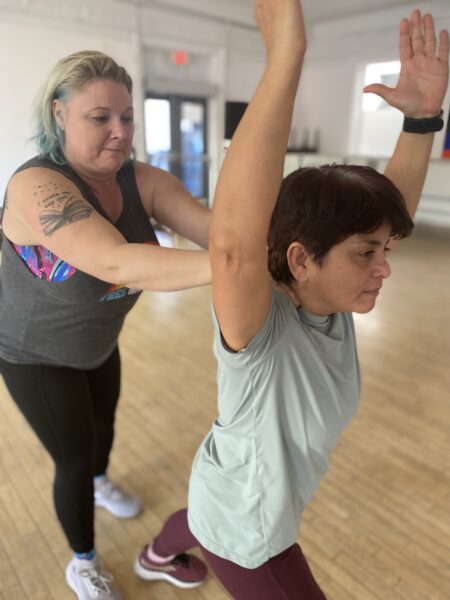SL, a 59-year-old Homes First cis-male client, a previous resident of Homes First’s 545 Lakeshore Shelter, now has a room in a shared unit in one of our non-24-hour supportive housing buildings where case management supports are provided three times a week during office hours. SL has high hopes for 2024, with resolutions that include finding a part-time job and getting back to the pool to set a record for the senior’s master program despite his physical disability. Another resolution is to continue attending his gym program and building muscle.
One significant hurdle from SL’s past that looms over his present ambitions occurred when, at the tender age of 17, SL experienced a life-altering industrial accident resulting in the loss of half of his left hand. In those days, the absence of mandatory Personal Protective Equipment (PPE), inadequate job training and lack of supervision contributed to his misfortune. Nevertheless, SL’s resilience has been unwavering. He has thrived as a painter, motorcycle racer, and swimmer, and he harbors a passion for boats. His zest for life is evident in his hobbies, which include exercising, walking, collecting art, singing Beatles tunes, and sharing laughter with others. With a magnetic personality and a sharp wit, SL is also tackling his battle with alcohol, focusing on his health and the multitude of goals he yearns to achieve.

SL’s journey to better health has been remarkable, with over 60 pounds shed in the past two years through fasting, consistent walking, and a dedicated gym routine. His strength is visibly increasing, now lifting nearly 140 pounds in 12-rep sets. Finding solace in spirituality, SL contemplates joining the nearby Anglican Church and takes pride in his steadfast commitment to his health regimen, including upcoming medical appointments.
The quest for employment is a challenge SL acknowledges requires thorough preparation. Crafting a resume and honing interview skills are crucial steps in this process. SL admits that articulating his strengths confidently in interviews has been a struggle, particularly when his disability becomes a focal point. His shyness is an obstacle he is determined to overcome. As he anticipates the job search, SL expresses hope for compassion and understanding from potential employers. He believes that securing a part-time job is imminent and understands that while having a stable home is a significant milestone, it is only the beginning of his journey toward self-actualization and pride.
Homes First’s provides client-driven case management support, focusing of providing access to specialized supports to help every individual – of all abilities – reach their goals. To achieve this for each client, our case managers often research and audit referral services, ensuring that our clients are being provided services that are empowered by understanding, empathy and dignity.
When supporting SL in finding employment, Intensive Case Management (ICM) Staff CP highlights that “the process of employability is not overnight as there are certain skills employers look for, for example, someone who has years of experience working for a company.” Additionally, Staff CP adds, “there is a flaw in the system as it focuses on young people but fails older out-of-work citizens. There is a gap in the services that promise employment, but what of people who have been out of the workforce for 5 plus years?” Staff CP adds that referrals for clients to agencies that offer addictions and employment counseling are made; however, this is also a slow process, as, like many services in Toronto, there is a backlog in services.
According to the Canadian Human Rights Commission report, “The Roadblocks on the career path: Challenges faced by persons with disabilities in employment” (2016), “40% of men with disabilities [in Ontario] consider themselves disadvantaged in employment because of their condition.” Additionally, the report shows that “approximately 30% of persons with disabilities aged 15+ who asked for workplace accommodation it was not made available.” In Ontario specifically, the proportion of adults with disabilities aged 15+ who report having been refused a job is 10.5% for women and 10.3% for men. Province-wide, 10.4% of the total population were facing disability-based discrimination in 2016 when looking for employment. The report shows that, despite legislation, Canada-wide, “persons with disabilities are facing physical and attitudinal barriers to employment.”
In recognition of Developmental Disabilities Awareness Month, SL’s story is a testament to the resilience and potential of individuals with disabilities. It underscores the importance of support, understanding, and opportunities in overcoming job difficulty, combating disability-related challenges, and preventing homelessness. SL’s narrative is not just one of personal triumph but also a call to action for society to create inclusive environments where everyone has the chance to thrive.
You can read more about employment and disability by accessing the following resources:
Roadblocks on the career path: Challenges faced by persons with disabilities in employment
Disability at Work: Cope with Challenges and Thrive
Disability in the workplace: Barriers to employment & retention


